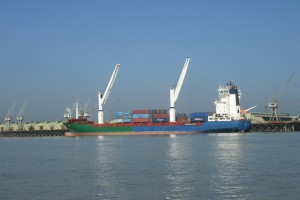Draft Bill of ‘Major Port Authorities Act, 2016’ uploaded on Ministry’s Website for Comments from Various Stakeholders
The Ministry of Shipping has prepared a draft Bill “Major Port Authorities Act, 2016” to replace the Major Port Trusts Act, 1963. With a view to promote the port infrastructure and facilitate trade and commerce. The proposed bill aims at giving more autonomy and flexibility to the major Ports and to bring in professional approach in their governance. This will help to impart faster and transparent decision making which will benefit the stakeholders.
The proposed Bill was earlier uploaded on the website of the Ministry of Shipping for receiving comments from various stakeholders. Based on the suggestions/comments from the stakeholders, the draft Bill has been modified and uploaded in the Ministry of Shipping’s website. The salient features of the new Bill are:
(a) Composition of board has been simplified. The board will consist of 10 members including 3 to 4 independent members instead of 17-19 under the present Port Trust Model. Provisions has been made for inclusion of 3 functional heads of Major Ports as Members in the Board apart from a Government Nominee Member and a Labour Nominee Member.
(b) The regulation to tariff by TAMP has been removed. Future PPP operators will be free to fix tariff based on market conditions and notify the Port Authority. The Board of the Port Authority has been delegated the power to fix the scale of rates for other port services and assets like land.
(c) Port related and non –port related use of land has been defined. A distinction has been made between these two usages in terms of approval of leases. The Port Authorities are empowered to lease land for Port related use for up to 40 years and for non-port related use upto 20 years beyond which the approval of the Central Government is required. For PPP projects the tenure of the lease of land would be as per the PPP policy of the Government.
(d) The need for Government approvals for raising loans, appointment of consultants, execution of contracts and creation of service posts have been dispensed with. The Board of Port Authority have been delegated power to raise loans and issue security for the purpose of capital expenditure and working capital requirement.
(e) Concept of internal audit of the functions and activities of the Central Ports has been introduced on the lines of Companies Act, 2015.
(f) An independent Review Board has been proposed to be created to carry out the residual function of the erstwhile TAMP for Major Ports, to look into disputes between ports and PPP concessionaires, to review stressed PPP projects and suggest measures to review stressed PPP projects and suggest measures to revive such projects and to look into complaints regarding services rendered by the ports/private operators operating within the ports would be constituted. At present, there is no independent body to look into the above aspects and the Review Board will reduce the extent of litigation between PPP Operators and Ports.
(g) Provisions of CSR & development of infrastructure by Port Authority have been introduced.
(h) The status of Port Authority will be deemed as ‘local authority’ under the provisions of the General Clauses Act, 1887 & other applicable Statutes so that it could prepare appropriate regulations in respect of the area within the port limits to the exclusion of any Central, State of local laws.
The detailed draft bill has been uploaded on the website of the Ministry of Shipping (www.shipping.nic.in) for review and comments from various stakeholders. After inter-Ministerial consultation, and approval of Cabinet, the Bill shall be placed before the Parliament for consideration.
Press Information Bureau

